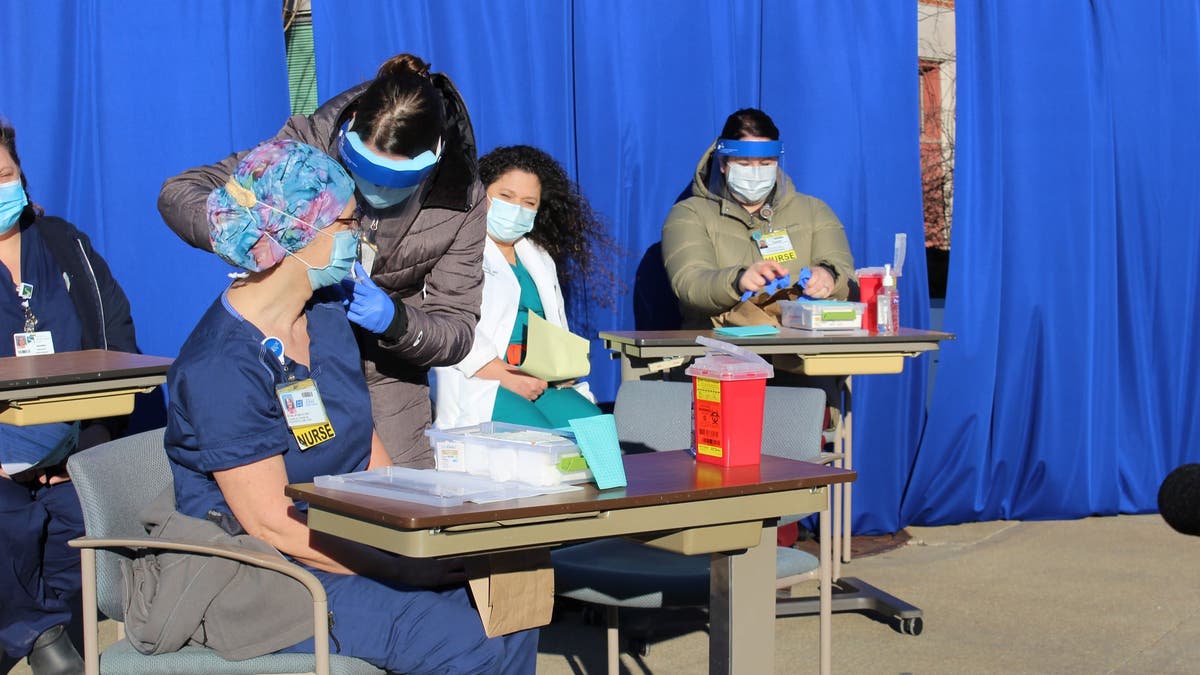Fox News Flash top headlines for December 15
Fox News Flash top headlines are here. Check out what's clicking on Foxnews.com.
While the nation’s health care workers who have been manning the coronavirus front lines for the last 10 months line up for their vaccinations, the Centers for Disease Control and Protection (CDC) released updated guidance to manage possible side effects.
“You may have some side effects, which are normal signs that your body is building protection,” per guidance on the CDC web page, updated Dec. 14. “These side effects may affect your ability to do daily activities, but they should go away in a few days.”

ICU nurse Heidi Kukla was the first person vaccinated for COVID-19 Tuesday morning in New Hampshire. (Elliot Hospital and Health System)
The U.S. saw its first emergency approval for a COVID-19 vaccine on Friday evening, after the Food and Drug Administration (FDA) upheld an advisory panel's vote to endorse Pfizer and BioNTech's product.
At a briefing Saturday, top FDA officials said only those who have serious allergic reactions to vaccines, or have allergies to ingredients in Pfizer's jab, should steer clear of the shot, per Reuters.
“We’re telling people that unless they’ve had a severe allergic reaction to the vaccine, or one of its components, they can receive it,” Dr. Peter Marks, director of the FDA’s Center for Biologics Evaluation and Research, said at the briefing, per the outlet.
FDA COMMITTEE DOCUMENTS ON MODERNA'S COVID-19 VACCINE FIND 'NO SPECIFIC SAFETY CONCERNS'
The CDC says common side effects from coronavirus vaccines include pain and swelling at the injection site, not unlike other vaccines. Vaccinated individuals may experience fever, chills, tiredness and headache as well.

iStock
DO YOU NEED A COVID-19 VACCINE IF YOU'VE ALREADY HAD THE VIRUS?
Though side effects are typically short-lived and resolve on their own within a few days, the federal health agency advised consulting a doctor about over-the-counter meds like ibuprofen or acetaminophen to resolve pain or discomfort.
Other steps to alleviate pain include placing a cool wet washcloth over the arm or exercising the arm, per the CDC. To tamp down discomfort from a fever, stay hydrated and dress lightly, the agency says.
However, if redness or tenderness at the injection site worsens after a day, symptoms persist, or if side effects are sparking anxiety, the CDC says to contact a health care provider.
ALLERGIC REACTIONS TO VACCINES RARE, SHORT-LIVED
Some side effects may feel like the flu, the CDC continued.
Pfizer’s vaccine requires two doses administered several weeks apart, similar to Moderna’s vaccine candidate. The CDC says to get both doses, even if side effects crop up after the initial jab, unless a doctor advises otherwise.
The country’s most vulnerable, like front-line health care workers and nursing home residents, will be among the first to receive COVID-19 vaccinations. Federal officials have said the general public will have available doses several months into 2021. In the meantime, health officials are urging the public to continue wearing masks, practice social distancing, maintain hand hygiene and avoid crowds.


